Intel's Core i7 870 & i5 750, Lynnfield: Harder, Better, Faster Stronger
by Anand Lal Shimpi on September 8, 2009 12:00 AM EST- Posted in
- CPUs
3dsmax 9 - SPECapc 3dsmax CPU Rendering Test
Today's desktop processors are more than fast enough to do professional level 3D rendering at home. To look at performance under 3dsmax we ran the SPECapc 3dsmax 8 benchmark (only the CPU rendering tests) under 3dsmax 9 SP1. The results reported are the rendering composite scores:
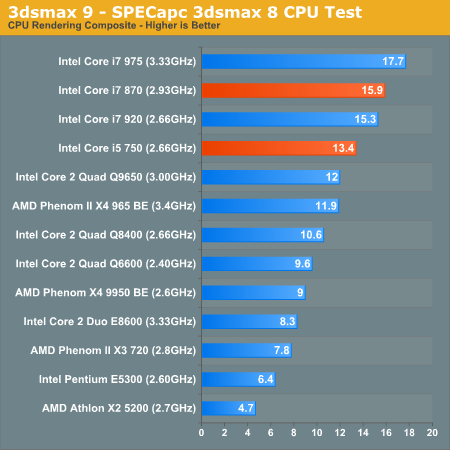
And we're back down to utter dominance yet again. The i5 750 is 12.6% faster than the Phenom II X4 965 BE and 18.8% cheaper. Harder, better, faster stronger.
Blender 2.48a
Blender is an open source 3D modeling application. Our benchmark here simply times how long it takes to render a character that comes with the application.
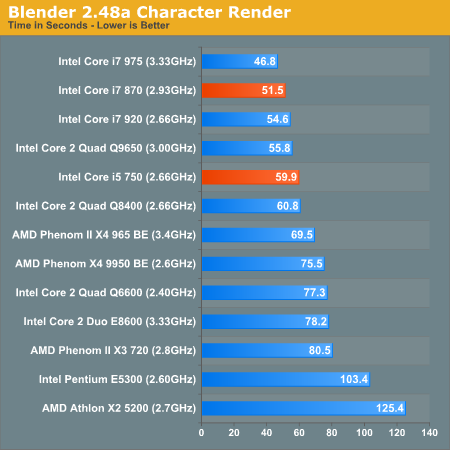
To get Blender to perform right on Lynnfield we actually had to update our graphics drivers. It looks like the on-die PCIe does require the latest NVIDIA/ATI drivers to work properly. The results aren't unusual; Intel has done very well in these tests and Lynnfield continues to dominate. The i5 750 is a bit slower than the 920 (and Q9650) thanks to its missing HT support.
Cinebench R10
Created by the Cinema 4D folks we have Cinebench, a popular 3D rendering benchmark that gives us both single and multi-threaded 3D rendering results.
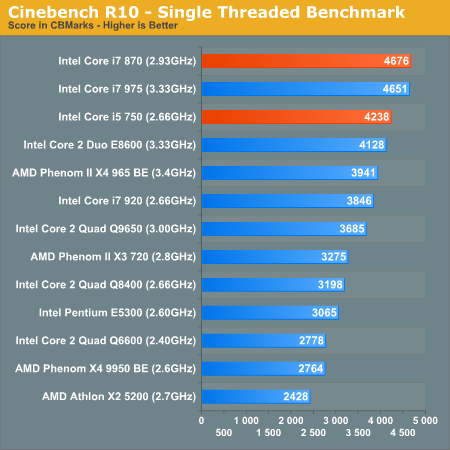
The single threaded benchmark tells us everything we need to know. The Core i5 750 and i7 870 are two of the fastest processors we've ever tested at single-threaded applications. Very few microprocessors will be able to retire instructions from a single thread as quickly as Lynnfield. This is actually very noticeable in simply using the OS. Many tasks still aren't multithreaded but they execute very, very fast on Lynnfield.
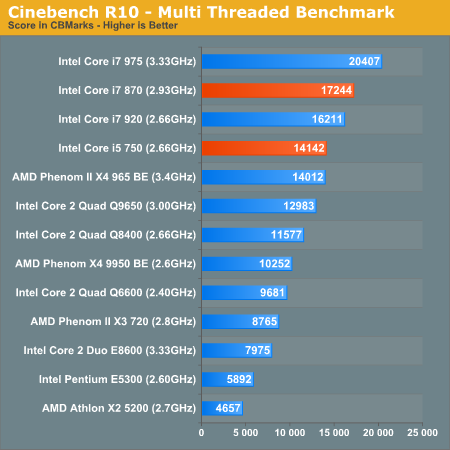
Crank up the threads and Lynnfield is still competitive. Because it's missing Hyper Threading, the i5 750 is barely faster than the Phenom II X4 965 BE. Although I understand Intel wanting to segment its product line, it seems that the i5's missing HT goes a bit too far.
POV-Ray 3.73 beta 23 Ray Tracing Performance
POV-Ray is a popular, open-source raytracing application that also doubles as a great tool to measure CPU floating point performance.
I ran the SMP benchmark in beta 23 of POV-Ray 3.73. The numbers reported are the final score in pixels per second.
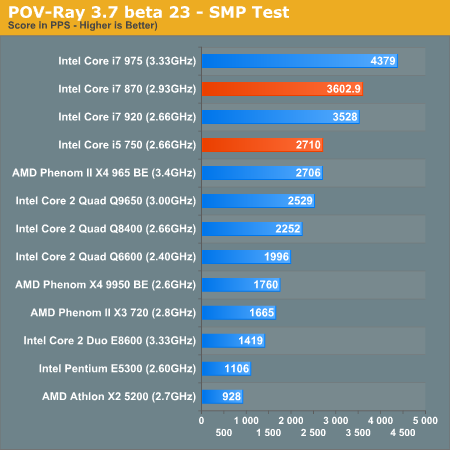
We see the same results under POV-Ray. Regardless of thread count, Lynnfield delivers the best performance possible short of a $1000 CPU.










343 Comments
View All Comments
klokaek - Monday, May 5, 2014 - link
Great article !! Can you please tell us your references of the article ?disctarradotcom - Tuesday, April 5, 2016 - link
Excellently written article, if only all bloggers offered the same level of content as you, the internet would be a much better place. Please keep it up!<a href="http://hydrofarm.co.id/en/blog-cara-tanam-hidropon... | <a href="http://ur-farm.com">Ur-farm</a> | <a href="http://ur-farm.com">organik</a> | <a href="http://ur-farm.com">organic</a> | <a href="http://laptopmalaysian.blogspot.com">lapto... malaysia</a> | <a href="http://laptopmalaysian.blogspot.com">lapto... price in malaysia</a>.
disctarradotcom - Tuesday, April 5, 2016 - link
Excellently written article, if only all bloggers offered the same level of content as you, the internet would be a much better place. Please keep it up!http://hydrofarm.co.id/en/blog-cara-tanam-hidropon...
http://ur-farm.com
http://laptopmalaysian.blogspot.com